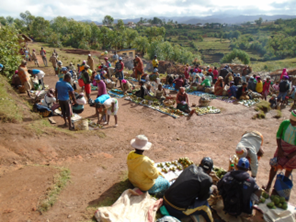FP026
Sustainable Landscapes in Eastern Madagascar (SLEM)
Sustainable Landscapes in Eastern Madagascar (SLEM)
This evaluation aims to assess the impact of the Sustainable Landscapes in Eastern Madagascar (SLEM) project (FP026). The SLEM project seeks to enhance the resilience of smallholder farmers and reduce carbon emissions through the implementation of climate-smart agriculture and sustainable forest management in two key landscapes: the Ankeniheny-Zahamena Forest Corridor (CAZ) and the Ambositra-Vondrozo Forest Corridor (COFAV). These corridors represent the largest remaining blocks of forest in eastern Madagascar, encompassing 660,000 hectares across 15 districts. To build resilient farming communities, SLEM provides direct support to vulnerable smallholder farmers in adopting sustainable agricultural techniques, strengthens their capacities in climate mitigation and adaptation, and supports community-based organizations and local governments.
-
TopicAgriculture & adaptive livelihoods
-
Project componentClimate-smart agriculture practices and ecosystem-based adaptation measures, alternative livelihoods strategies, equipment to community patrollers, physical demarcation of protected areas, trainings of patrollers and associations.
-
Impact evaluation designDifference-in-Difference (DiD)
Randomised Control Trial (RCT)
-
Target beneficiariesThe project claims to support 87.500 direct beneficiaries | Sub group and qualitative analysis will also be used to assess the gender sensitivity of the project's interventions.
Timeline
Project implementation
Apr 2019
Submission of baseline report
Sep 2019
Project implementation for PHASE 3 areas
Nov 2022
Submission of midline report
Aug 2023
Project to be completed
Nov 2024
One region
- Africa
One country
- Madagascar
Reports
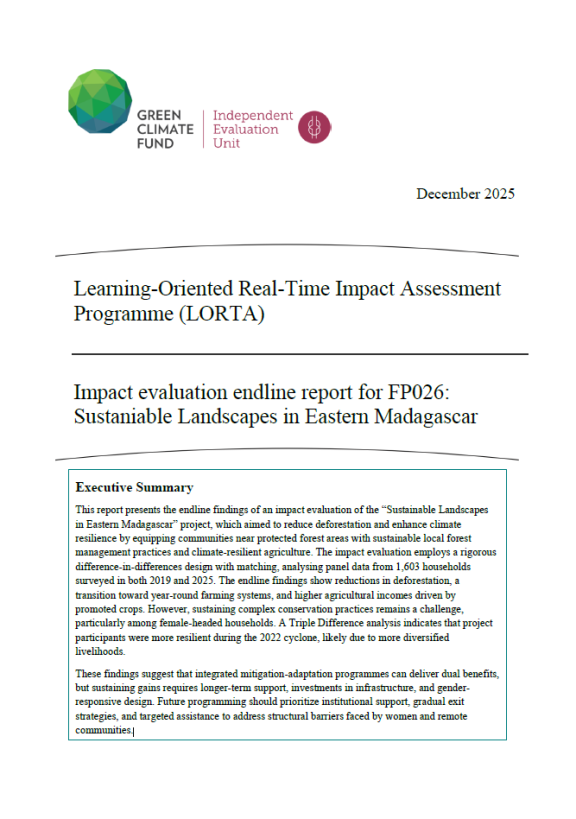
Impact evaluation endline report for FP026: Sustaniable Landscapes in Eastern Madagascar
31 Dec 2025
This report presents the endline findings of an impact evaluation of the Sustainable Landscapes in Eastern Madagascar project, which aimed to reduce deforestation and strengthen climate resilience through sustainable forest management and climate-resilient agriculture. Using a rigorous difference-in-differences design and panel data from 1,603 households surveyed in 2019 and 2025, the evaluation finds reductions in deforestation, increased adoption of year-round farming systems, and higher agricultural incomes.
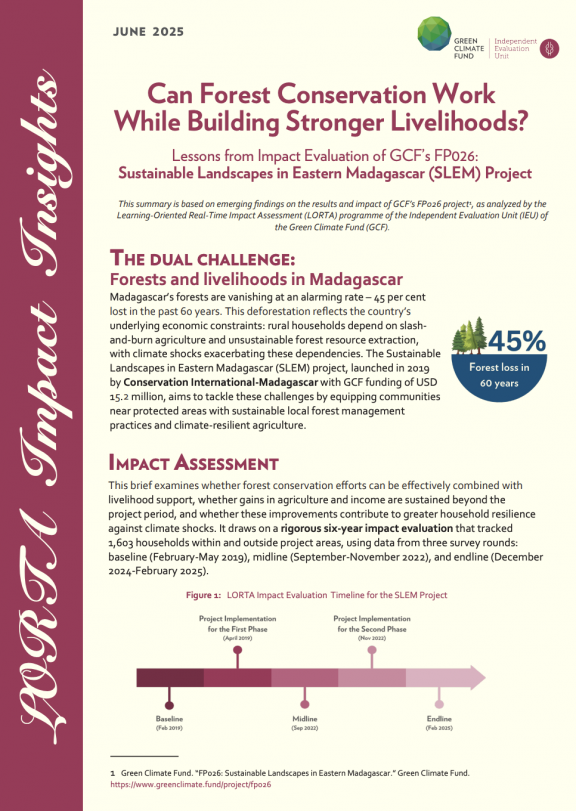
Impact Insights: Can Forest Conservation Work While Building Stronger Livelihoods?
25 Jun 2025
This Impact Insights brief presents emerging findings from the six-year impact evaluation of GCF’s FP026 project in Madagascar. Conducted under the IEU’s LORTA programme, the study explores how forest conservation efforts can align with improved livelihoods and resilience. The brief highlights reductions in deforestation, income gains from climate-resilient crops, and the importance of sustained support systems, especially for female-headed households.
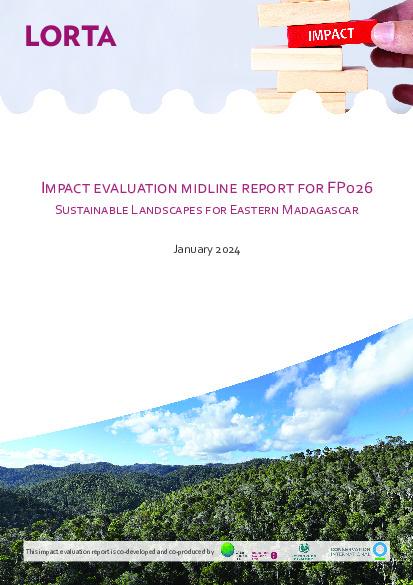
Impact Evaluation midline report for FP026 - Sustainable Landscapes for Eastern Madagascar
17 Jan 2024
The Sustainable Landscapes for Eastern Madagascar (SLEM) project (FP026) aims to increase the resilience of smallholder farmers and reduce carbon emissions by implementing climate-smart agriculture and sustainable forest management in two corridors covering 660,000 hectares over 15 districts. These corridors are the two remaining large blocks of forest in the eastern part of Madagascar.
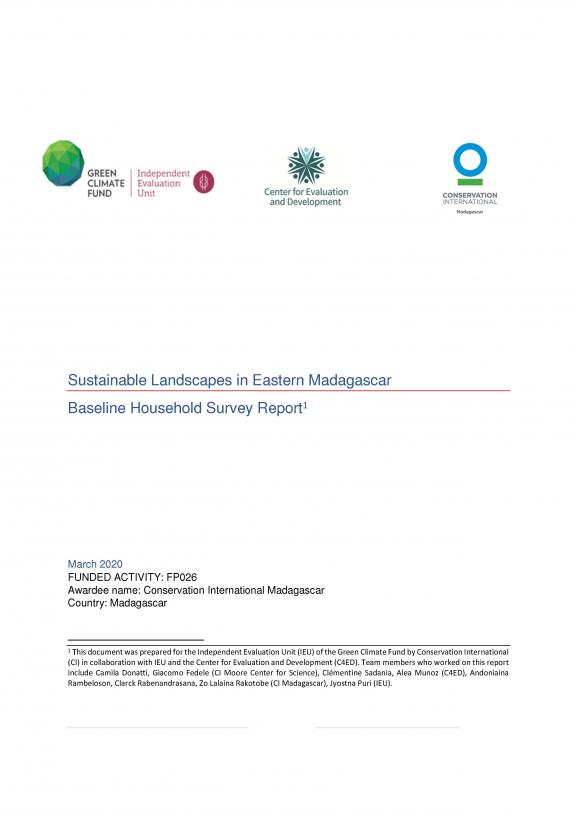
Sustainable Landscapes in Eastern Madagascar : Baseline Household Survey Report
04 Mar 2020
This report presents the findings of the baseline household survey for the project "Sustainable Landscapes in Eastern Madagascar" supported by the Independent Evaluation Unit of the Green Climate Fund (GCF) and implemented by Conservation International (CI).
Impact
Forthcoming
Midline results show significant improvements in households’ short-term outcomes, with widespread adoption of a range of conservation agriculture practices, such as soil conservation, agroforestry, terracing and drought-resistance crops
Midline results show an increase in the proportion of early beneficiaries conducting farm livelihoods, non-farm livelihoods and conducting off-farm livelihoods
The midline evaluation found a reduction in the proportion of households deriving income from non-environmentally sustainable activities
Midline results show how women-headed households are driving the adoption of soil conservation measures.
The midline evaluation showed an improvement in food security status of early beneficiaries as represented by the Consolidated Approach for Reporting Indicators of Food Security Index
Impact stories
![]()
Is the GCF targeting the right beneficiaries?
30 Jun 2023 / As mandated by the Paris Agreement, the Green Climate Fund (GCF) supports developing countries realize pathways towards low-emissions and climate-resilient development. These pathways are described in Nationally Determined Contributions (NDCs), which each Party to the Agreement updates every five years. To support this process, the GCF allocates half of its adaptation programming to particularly vulnerable countries: the small island developing States (SIDS), the least developed countries (LDCs) and African States.
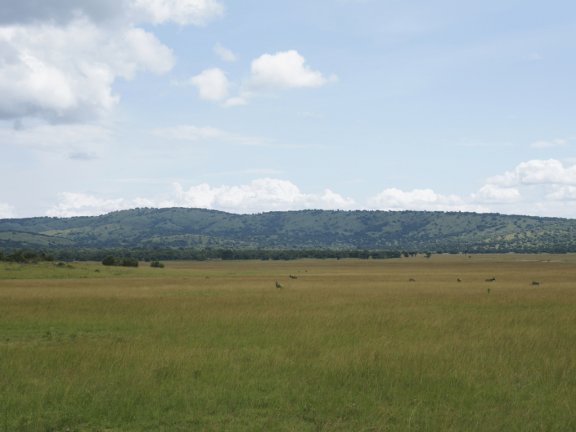
Is the GCF targeting the right beneficiaries?
30 Jun 2023 / As mandated by the Paris Agreement, the Green Climate Fund (GCF) supports developing countries realize pathways towards low-emissions and climate-resilient development. These pathways are described in Nationally Determined Contributions (NDCs), which each Party to the Agreement updates every five years. To support this process, the GCF allocates half of its adaptation programming to particularly vulnerable countries: the small island developing States (SIDS), the least developed countries (LDCs) and African States.
Details
The Sustainable Landscapes in Eastern Madagascar (SLEM) project includes a portfolio of activities, focusing on adaptation and mitigation efforts for this impact evaluation.
Sustainable landscapes in FP026 (© Clarck Rabenandrasana)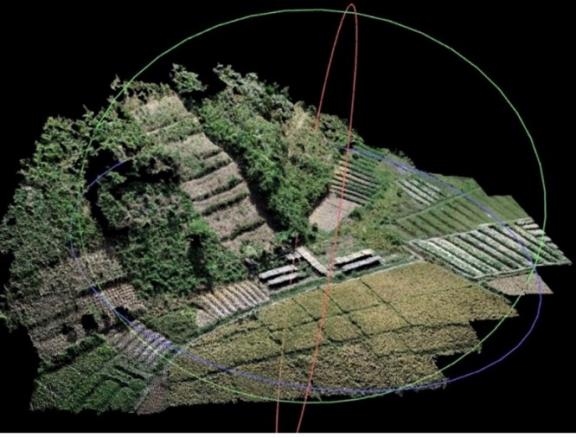
LORTA’s impact assessment focuses on evaluating the project’s adaptation and mitigation activities. This evaluation will primarily rely on household surveys conducted during the timespan of the project, but qualitative interviews will also be conducted. Secondary data, such as satellite images will be an essential part of the evaluation of mitigation activities.
